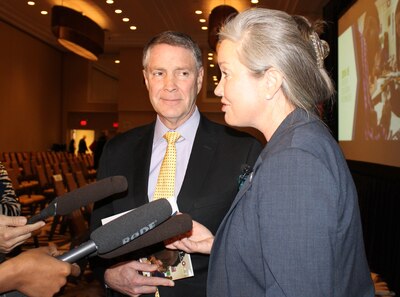While Tennessee students are making substantial gains on math and reading tests, they still lag behind most other states in academic achievement, with barely a fifth of high school students prepared for college, according an independent report released Friday on the state of education in Tennessee.
Founded and championed by former U.S. Senate Majority Leader Bill Frist, the State Collaborative on Reforming Education (SCORE) released its 2014-15 findings and urged the Tennessee General Assembly to retain newly implemented Common Core, a set of English and math learning standards, as the state prepares to launch its new assessment aligning with those standards.
“Tennessee has shown significant and admirable progress in student achievement since [our] first State of Education in Tennessee report in 2010 because we have consistently been willing to make student-focused policy decisions and follow through with the work they required,” Frist told about 150 education, government and business leaders in Nashville.
SCORE President and CEO Jamie Woodson said later that SCORE welcomes the legislature’s “review process” of Common Core to ensure continuous improvement and higher standards for Tennessee students. “We want to make sure this is a foundation we build on,” she said.
In addition to retaining and improving Common Core standards, SCORE urged the implementation of a high-quality assessment that is nationally benchmarked and aligned to the new standards. “One of the biggest challenges educators faced in 2014 was the misalignment between Tennessee’s State Standards and current end-of-year assessments in math and English language arts,” said the report’s executive summary.
The state is replacing its Tennessee Comprehensive Assessment Program, known as TCAP, and has hired a North Carolina company to administer a new assessment called Tennessee Ready, or TNReady, for math and English language arts, beginning with the 2015-16 school year.
Noting that Tennessee ranks 40th in the nation in average teacher pay, SCORE also underscored the importance of elevating the teaching profession and developing high-quality leaders as principals.
Candice McQueen, the state’s incoming education commissioner who was on hand for the SCORE event, commended the recommendations and said the report’s data and research are useful to the state as she starts her new job on Jan. 20.

The annual report by SCORE is based on data and extensive interviews conducted by the nonprofit and nonpartisan advocacy and research institution founded by Frist in 2009.
Improving K-12 academic achievement in Tennessee has been a top priority of Gov. Bill Haslam’s administration. In 2010, Tennessee became one of the first states in the nation to receive a $500 million Race to the Top grant, aimed at turning around under-performing schools by, among other things, improving teacher quality and expanding charter schools, which are publicly funded but independently operated schools. The state created a state-run Achievement School District to absorb some of its lowest-performing schools and overhauled the way principals evaluate teachers. It also adopted new Common Core learning standards that determine what students must learn by the end of each year.
Tennessee’s education initiatives gained national recognition in 2013 when its National Assessment for Educational Progress (NAEP) scores outpaced every state in the nation. But teacher advocacy groups have complained that the training and resources to teach the new standards are inadequate and that stagnant wages and the new teacher evaluation process have led to low teacher morale. Last year amid budget restraints, the governor delayed his plan to give teachers a 2 percent raise.
Most of the Race to the Top money has been spent, and local education leaders complain that their districts are not being adequately funded.
SCORE leaders hope the group’s 72-page report advances the conversation about education at all levels. “It’s our best attempt to engage all Tennesseans,” Frist said.


